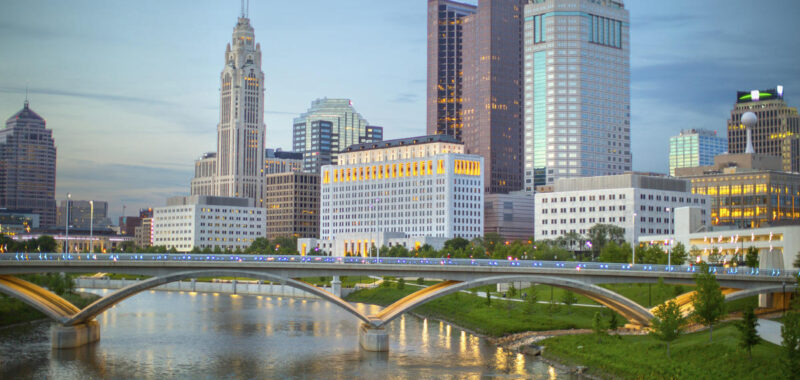Faced with high prices and mortgage rates, homebuyers are flocking to certain sections of the Midwest and metro-adjacent areas in the Northeast and Midwest in search of the right balance of affordable prices and desirable locales, according to Realtor.com’s annual list which ranks the “Hottest Zip Codes” in the U.S.
The U.S. housing market is in a deep sales slump, thanks to the double whammy of high borrowing costs and home prices that have priced many homebuyers out of the market. But don’t expect properties in these zip codes to sit around for very long, according to Realtor.com. Properties in these zips saw between 2.9 and 5.2 times more views than the average U.S. home listing, and spent between 32 and 45 fewer days on the market in the first six months of the 2024.
In keeping with last year’s results, Midwest and Northeast zip codes dominated the top 10 slots on Realtor.com’s list once again. Three of the top 10 hottest zip codes are in the Midwest, where housing prices on average were 24.6% lower than the national median in June. The remaining seven zip codes are in the Northeast, where average home prices in the three most affordable neighborhoods was 28.8% below the U.S. median in June.
“The hottest zip codes emphasize the importance this year’s home shoppers are placing on affordability,” said Hannah Jones, senior economic research analyst with Realtor.com. “Prices in each zip code are either lower than the national median or than the zip’s surrounding metro.”
The real estate site calculated the most popular zip codes by measuring unique views of properties listed on their website, and how many days each listing remained active.
Location matters too
Not all homebuyers are focused on the price tag, according the Realtor.com report, which found that many house hunters are also looking to capitalize on strong local economies like Columbus and St. Louis. Living in close proximity to major economic hubs gives consumers the benefits of city life without having to sacrifice space, affordability or quality of life.
For example, No. 4 on the list, ZIP 07920, or Basking Ridge, New Jersey, provides more affordable living options within commuting distance to New York City. Although the median listing price for the area edges close to a million, at $967,000, it’s still a relative bargain next to prices in the Big Apple. In June 2024, the median listing price per square foot in the New Jersey town was $365, or 33.6% lower than the surrounding metro area’s average.
Here’s a look at the most fiercely competitive zip codes, and what buyers can expect in these markets moving forward.
Zips that made top 10
For the second year in a row, ZIP 43230, Gahanna, Ohio, came in at No. 1. Home to Ohio State University and a vibrant food and art scene, Gahanna offers all of the “amenities and quality-of-life advantages of a larger town, but at a lower price point,” the report says.
The small Ohio city, which has a population of 35,000, drew significant interest from buyers in the nearby capital of Columbus, which was responsible for over half of the Realtor.com views on Gahanna listings.
“The large amount of within-metro viewership suggests that homeowners in the hot Columbus market are shopping around to perhaps cash in on existing home equity to fund an upgrade or possibly to purchase an investment property,” the report says.
Other top Midwest zips that made it onto the list include ZIP 63021 (Ballwin, MO) which ranked second, and ZIP 46322 (Highland, IN), which ranked ninth. All three were also on last year’s list.
The Northeast also proved to be a hotspot for buyers, with seven of the top 10 zip codes stemming from that region. Zips that made it onto the list include ZIP 01970 (Salem, MA), which ranked third; ZIP 07920 (Basking Ridge, NJ), which ranked fourth; and ZIP 14609 (Rochester, NY) which ranked fifth.
Demand for houses in hot zip codes in the Midwest and Northeast has grown despite a rise in inventory of an average 5.7% annually in the first half of 2024. The increase in demand has, however, pushed median listing prices in those areas an average 7.4%, compared with a 0.4% increase nationally.
Meanwhile, buyer interest has waned in regions in the South and West, which did not make this year’s list and have become less affordable due to a surge in prices post-COVID and an increase in housing supply, according to Realtor.com.
What to expect in the markets moving ahead
Jones from Realtor.com said she expects the Midwest and Northeast to maintain a strong hold on the market, especially as buyers continue to seek out affordable options outside of major metropolitan hubs.
But as demand peaks in these areas, consumers can also expect more price increases to follow. That doesn’t mean that buyers can’t get a deal, Jones said, but they will have to keep a close eye on the market and be ready to pounce, offer in hand, when the moment comes.
“Even with recent price growth, the country’s hottest zips still offer buyers relatively affordable homeownership,” she said. “However, buyers will face fierce competition in these red-hot markets.”
The Realtor.com analyst said buyers can stay ahead of the curve by saving searches on their site or exploring the Market Hotness map layer, which allows users to compare the demand across different zips.

